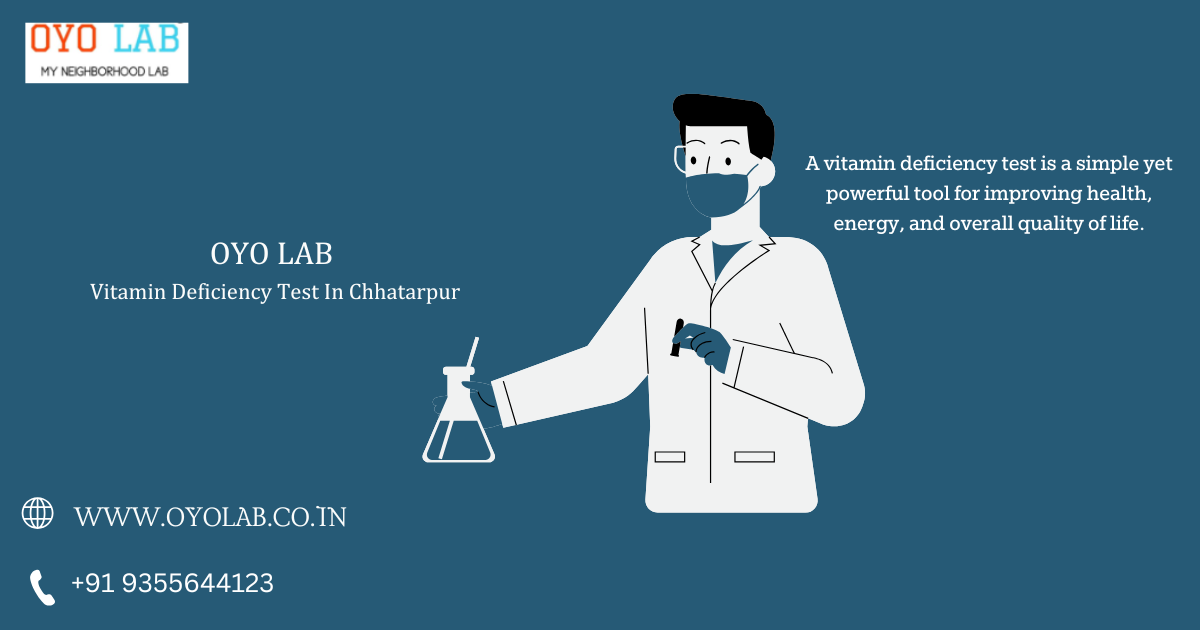
Vitamin Deficiency Test In Chhatarpur
By Shilpa | March 04, 2025
What Is Vitamin Deficiency Test ?
A Vitamin Deficiency Test is a medical test used to determine if your body has low levels of essential vitamins. These tests help identify deficiencies that may lead to health issues such as fatigue, weakened immunity, poor skin health, or neurological problems.
Types of Vitamin Deficiency Tests
These tests can check for deficiencies in vitamins such as:
- Vitamin D (important for bone health)
- Vitamin B12 (crucial for nerve function and red blood cells)
- Vitamin C (important for immunity and skin health)
- Vitamin A (needed for vision and immune function)
- Vitamin E (acts as an antioxidant)
- Vitamin K (important for blood clotting)
- Folate (Vitamin B9) (essential for DNA synthesis and pregnancy)
How Is It Done?
- Blood Test – A blood sample is drawn and analyzed for vitamin levels.
- Urine Test – Some vitamins can be detected through urine samples.
- Hair Analysis – Occasionally used, but less common and less accurate.
When Should You Get Tested?
You may need a vitamin deficiency test if you experience:
- Fatigue or weakness
- Frequent infections
- Hair loss or brittle nails
- Pale or yellowish skin
- Tingling in hands and feet
- Muscle or joint pain
Importance Of Vitamin Deficiency Test
A Vitamin Deficiency Test is essential for maintaining overall health and preventing long-term complications. Here’s why it matters:
1. Identifies Nutritional Deficiencies
- Helps detect low levels of essential vitamins before they lead to serious health problems.
- Pinpoints which specific vitamins your body lacks.
2. Prevents Health Issues
- Vitamin D deficiency can cause weak bones and osteoporosis.
- Vitamin B12 deficiency may lead to anemia, fatigue, and nerve damage.
- Vitamin C deficiency can result in weakened immunity and slow wound healing.
- Vitamin A deficiency affects vision and skin health.
3. Improves Energy Levels and Well-being
- Correcting vitamin deficiencies can reduce fatigue, improve mood, and enhance overall well-being.
4. Supports Immune System and Organ Function
- Vitamins play a key role in immune function, heart health, brain function, and digestion.
- A deficiency test ensures your body gets the nutrients it needs to function properly.
5. Helps Personalize Your Diet and Supplements
- Results guide dietary changes and supplement choices to meet your body’s specific needs.
- Prevents overuse of supplements, which can be harmful.
6. Beneficial for At-Risk Groups
Certain people are more prone to deficiencies and should consider regular testing:
- Pregnant women (Folate, Vitamin D, Iron)
- Elderly individuals (Vitamin B12, D)
- Vegans & vegetarians (Vitamin B12, Iron, Omega-3s)
- People with digestive disorders (Celiac, Crohn’s disease)
7. Aids in Disease Prevention
- Long-term deficiencies can contribute to conditions like heart disease, osteoporosis, and neurological disorders.
- Early detection and correction help prevent serious complications.
Benefits Of Vitamin Deficiency Test
A Vitamin Deficiency Test offers several health advantages by identifying nutrient imbalances early and guiding necessary dietary or lifestyle changes. Here are the key benefits:
1. Early Detection of Deficiencies
- Identifies low vitamin levels before they cause serious health issues.
- Helps address symptoms like fatigue, hair loss, or weak immunity before they worsen.
2. Prevents Chronic Health Conditions
- Reduces the risk of osteoporosis (Vitamin D, Calcium deficiency).
- Prevents anemia and nerve damage (Vitamin B12, Iron deficiency).
- Lowers chances of cardiovascular diseases and cognitive decline.
3. Improves Energy Levels and Overall Well-being
- Correcting deficiencies helps boost energy, reduce fatigue, and enhance concentration.
- Supports better mood and mental clarity, especially in cases of Vitamin D and B12 deficiency.
4. Strengthens the Immune System
- Adequate Vitamin C, D, and Zinc levels help fight infections and promote faster recovery.
- Prevents frequent colds, flu, and other illnesses.
5. Enhances Skin, Hair, and Nail Health
- Vitamins like Biotin (B7), Vitamin E, and Vitamin C improve skin glow, hair growth, and nail strength.
- Reduces issues like dry skin, hair thinning, and brittle nails.
6. Personalized Nutritional Guidance
- Helps tailor your diet and supplement intake based on actual needs.
- Prevents excessive supplement use, which can be harmful.
7. Beneficial for High-Risk Groups
- Pregnant women (Folate, Iron, and Vitamin D for baby’s development).
- Elderly individuals (Vitamin B12 for brain function, Vitamin D for bone strength).
- Vegans & vegetarians (Vitamin B12, Iron, Omega-3s).
- People with digestive disorders (Celiac, Crohn’s disease affecting nutrient absorption).
8. Supports Long-Term Health
- Helps maintain optimal nutrient levels to support heart health, brain function, and overall longevity.
- Reduces the likelihood of developing age-related health issues